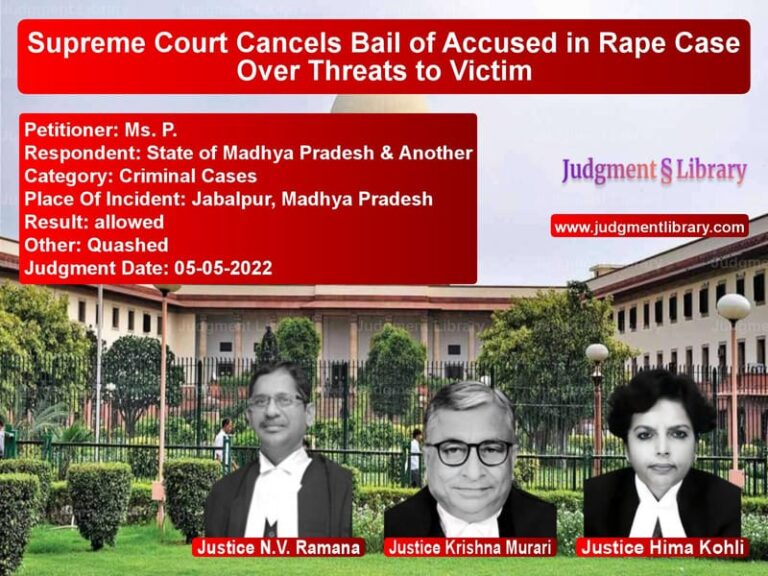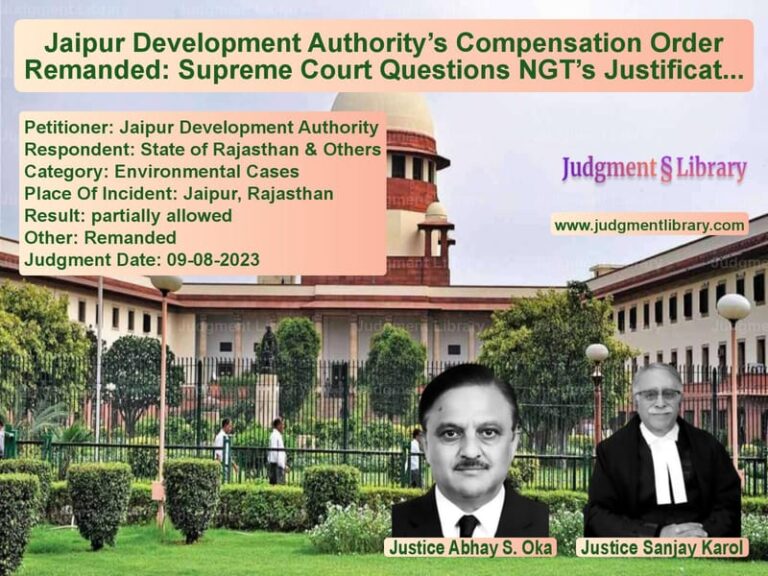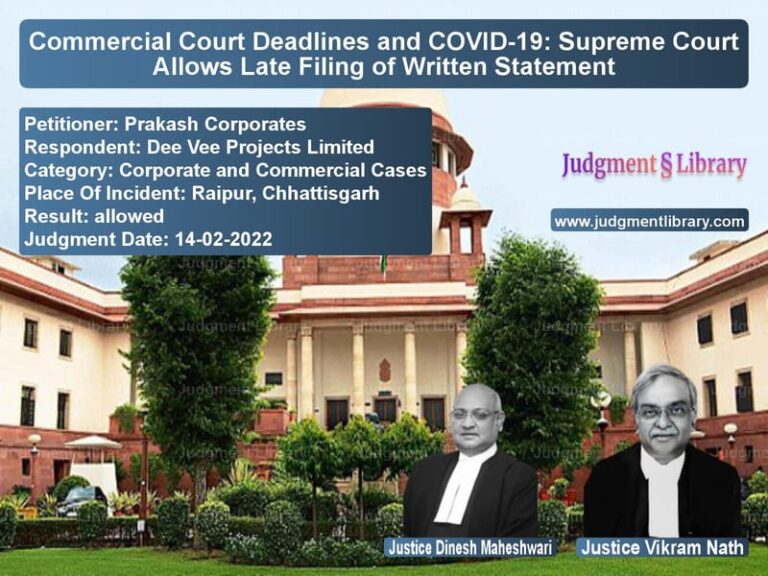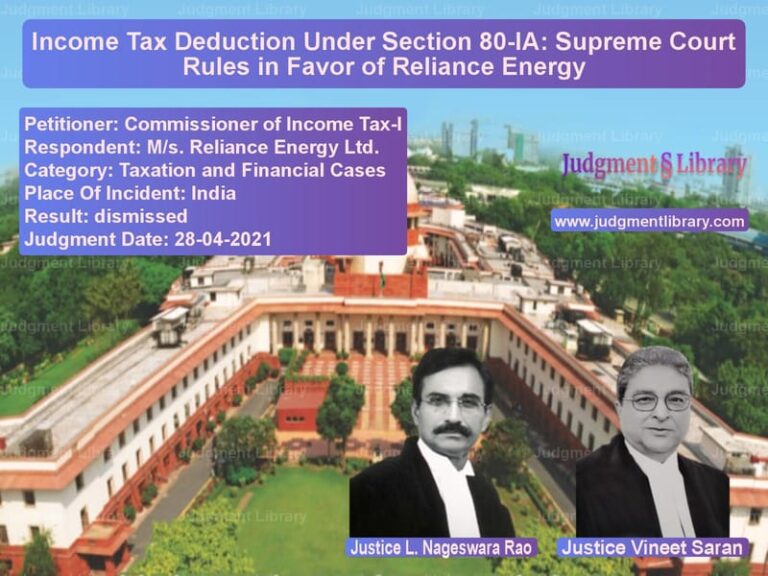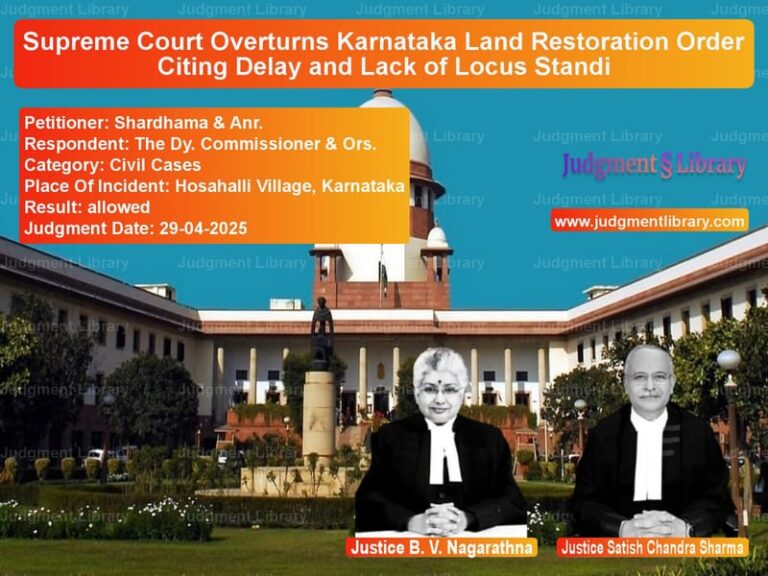Direct Recruitment Qualification: Supreme Court Overrules Orissa High Court’s Decision
The Supreme Court of India recently ruled in the case of State of Orissa v. State (TRYSEM) Live Stock Inspector Sangha & Others, where the primary dispute was whether the educational qualification for direct recruitment should be determined based on the date of vacancy or at the time of recruitment. The Court clarified that for direct recruitment, the qualifications in force at the time of recruitment must be applied, rather than those prevailing when the vacancy arose.
Background of the Case
The case arose from recruitment disputes related to the post of Livestock Inspector under the Orissa Non-Gazetted Veterinary Technical Service (Recruitment and Conditions of Service) Rules, 1984. The original rules required candidates to have a matriculation qualification. However, in 1997, the rules were amended to require an Intermediate in Science or equivalent.
The respondents, who were trained under the TRYSEM (Training of Rural Youth for Self-Employment) program between 1994 and 1997, sought appointments based on the pre-1997 qualification criteria. The Orissa High Court ruled in their favor, holding that vacancies existing before the amendment should be filled using the earlier qualification requirements. The State of Orissa challenged this decision in the Supreme Court.
Key Legal Issues
- Whether educational qualifications for direct recruitment should be determined at the time of vacancy occurrence or at the time of recruitment.
- Whether the respondents had a vested right to be recruited under the old qualification criteria.
- The applicability of the 1997 amendment to ongoing recruitment processes.
Arguments Presented
State of Orissa’s Arguments
The State of Orissa contended that:
- The amendment to the recruitment rules in 1997 superseded the previous qualifications.
- The principle of “qualification at the time of recruitment” is well established in service jurisprudence.
- Applying outdated qualification criteria would disrupt uniform recruitment policies.
Respondents’ Arguments
The respondents argued that:
- They had undergone government-approved training under TRYSEM between 1994 and 1997, with the expectation of being recruited based on the qualifications prevailing at that time.
- Earlier batches of trained candidates had been appointed under the old rules.
- They were being unfairly excluded due to a policy change made after their training.
Supreme Court’s Observations
The Supreme Court, comprising Justices Kurian Joseph and Sanjay Kishan Kaul, analyzed the legal position regarding recruitment qualifications and ruled in favor of the State of Orissa.
On the Applicability of Qualification Rules
“In direct recruitment, the candidate should possess the qualification as per rules which are in force at the time of recruitment, irrespective of the date of occurrence of vacancy.”
The Court emphasized that direct recruitment involves multiple policy considerations and is not merely a matter of filling old vacancies.
On the Expectation of Appointment
“No candidate who does not possess the currently prescribed qualifications, but who may possess the educational qualifications prescribed earlier, can be said to qualify or have any vested right to appointment even against some earlier unfilled vacancy.”
The Court clarified that training under government programs does not guarantee employment, particularly when eligibility criteria change.
On the Misinterpretation by the High Court
“The High Court wrongly treated the amended 1997 rules as a separate set of rules rather than amendments to the 1984 rules.”
The Supreme Court found that the High Court’s reasoning was flawed, as it assumed that pre-amendment rules should still apply to vacancies from earlier years.
Final Judgment and Directives
The Supreme Court ruled as follows:
- The qualifications prescribed at the time of recruitment, not the date of vacancy, will apply.
- The Orissa High Court’s judgment was set aside.
- Direct recruitment candidates must meet the educational standards in force at the time of appointment.
- TRYSEM-trained candidates may request a relaxation in qualification, but such a decision is at the discretion of the state government.
Implications of the Judgment
- Uniform Application of Recruitment Rules: The ruling ensures that outdated qualifications are not used for recruitment.
- Clarification of Direct Recruitment Standards: The judgment reinforces the principle that eligibility is determined at the time of recruitment.
- Guidance for Future Cases: This decision serves as a precedent for similar disputes involving amended qualification requirements.
Conclusion
The Supreme Court’s decision in State of Orissa v. State (TRYSEM) Live Stock Inspector Sangha & Others provides clarity on the applicability of educational qualifications in direct recruitment. By overturning the Orissa High Court’s ruling, the judgment upholds the principle that recruitment standards should be based on current regulations rather than historical criteria. The decision ensures fairness and consistency in government hiring policies.
Petitioner Name: State of Orissa.Respondent Name: State (TRYSEM) Live Stock Inspector Sangha & Others.Judgment By: Justice Kurian Joseph, Justice Sanjay Kishan Kaul.Place Of Incident: Orissa.Judgment Date: 14-08-2018.
Don’t miss out on the full details! Download the complete judgment in PDF format below and gain valuable insights instantly!
Download Judgment: State of Orissa vs State (TRYSEM) Live Supreme Court of India Judgment Dated 14-08-2018.pdf
Direct Downlaod Judgment: Direct downlaod this Judgment
See all petitions in Recruitment Policies
See all petitions in Public Sector Employees
See all petitions in Promotion Cases
See all petitions in Judgment by Kurian Joseph
See all petitions in Judgment by Sanjay Kishan Kaul
See all petitions in allowed
See all petitions in supreme court of India judgments August 2018
See all petitions in 2018 judgments
See all posts in Service Matters Category
See all allowed petitions in Service Matters Category
See all Dismissed petitions in Service Matters Category
See all partially allowed petitions in Service Matters Category


